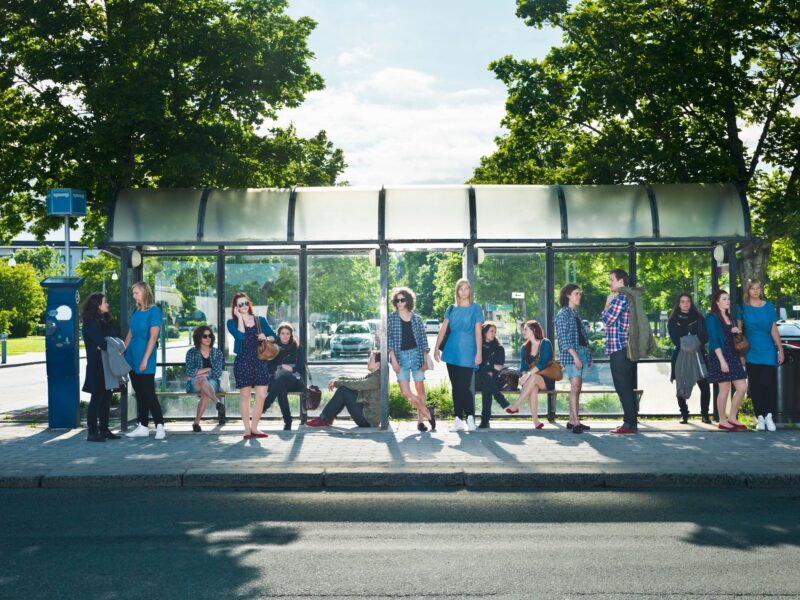Being offered your first proper job is a real thrill for many people. Even if you’ve trained for it specifically, there’s always something different about doing it for real. With that in mind, here are twelve tips to help you hit the ground running in your first proper job.

Check when and where you’re supposed to arrive
Your first day at a new job will probably be fairly similar to your first day at college. In other words, it will probably be less about doing actual work and more about sorting out administration. Depending on how the company/organization functions, this may mean you have to report to a different building than the one in which you will later work.
Have a clear plan to get where you need to be
If you’re going by public transit, check you understand the exact route and the scheduling. Also, make sure you know how to buy tickets e.g. do you buy before you board or can you buy after? If possible, buy your tickets in advance. If you can’t buy them in advance, have cash and your card, just to be on the safe side.
If you’re going by car, make sure that you look up the route on a reliable map. Remember that sat nav is not guaranteed to be 100% accurate and reliable, even in cities. Online maps are generally pretty good, but unless you know the area well, it’s a good idea to double-check with a regular map.
Make sure you’re clear on your options for parking. Remember that company car parks are not necessarily made available to everyone all the time. If you can’t get on-site parking, then try to find paid, secure parking in the area, even if it means you have a longer walk. Once you know the locality, you’ll be able to figure out where it is and isn’t safe to park.

Figure out the transport options as quickly as you can
You probably spent a lot of your early days at college figuring out the best way to get around campus. It’s generally a good idea to put at least the same level of effort into figuring out the best way(s) to get to and from your new job. There are three reasons for this.
Firstly, you need to think about safety. A college campus is a self-contained area, usually with its own security personnel. This is very different from a regular commute. You’ll need to figure out for yourself which routes are safe and which aren’t, especially if you’re using public transit.
Secondly, you’ll want to save yourself as much time as possible. Being late for a class is bad, being late for a job can be a lot worse. It’ll happen from time to time but you want to avoid it. Thirdly, understanding your transport options lets you look for the best deal on travel.
Know who to contact if there’s a problem
Ideally, you want to have a specific person to contact if there is a problem. Once you’re settled into your job, this will generally be your boss. In the early days, however, it may be HR. In either case, you usually want to avoid using the switchboard as these can be very busy.
On that point, make sure that you have your phone with you and that’s fully charged and, if necessary, has credit. These may all seem like obvious points, but if you’re excited and/or nervous, it can be easy to overlook them.
Make sure you understand the dress rules
Firstly, you need to know whether or not you’re expected to wear a uniform. If you are expected to wear a uniform, then you need to know who provides it. If you need to get your own uniform, then check if your employer has a recommended supplier. If not, then the best option is usually just to go with a recognized option for your industry like Uniform Advantage medical uniforms.
The reason why you want to stick with a popular brand is that popular brands tend to be popular for a reason. For example, in the case of nurses’ scrubs, they’ll be brands that feel comfortable no matter what you’re doing or what the temperature is. They’ll also hold their shape so they look smart even at the end of a long shift, resist stains and be easy to clean.
You also need to know if you’re expected to wear your uniform all the time. Some employers only require their employees to wear uniforms if they’re likely to be seen. If they’re scheduled for a day when they’re not going to be on view, then it may be perfectly acceptable to wear regular clothes. This would typically apply on days when you were training.
Even if you don’t have to wear a uniform, then you almost certainly have to abide by a dress code. It’s important to find out what this is. Try to get a copy of the dress code before you start. If you can’t, then the safest option is clothes that cover the whole body, in neutral colors and without logos or slogans. Keep jewelry and makeup to a minimum.
Invest in a pair of comfortable shoe
Unless you’re actually working in fashion (and possibly even then), comfort is more important than style when you’re starting a new job. Once you’ve settled into your role, you’ll be able to judge when you can wear shoes that look good but aren’t necessarily great for walking. In the early days, however, always wear comfortable (but smart) shoes.
Remember that the early days in a new job are usually more about admin than everyday work. You’ll be figuring out your way around the building(s), maybe going to training sessions, definitely meeting and greeting (and maybe shadowing) people. Basically expect to be on your feet a lot.
Check if you need to bring any equipment
In general, employers will provide any equipment you need. Usually, only freelancers need their own equipment. It can, however, be worth checking if there is anything you need to get yourself. Even if there isn’t, it can be more convenient to bring at least some basics like a tablet, a regular notebook, and a pen.
Check where you can get food
Almost all workplaces will have some places nearby where you can get food plus some kind of kitchen facilities. In the early days, however, it can be smart to bring food you can eat cold so you know for sure that you’re covered.
Bring any necessary paperwork
Unless it’s already been checked, most employers are probably going to want to see your ID. They’ll also need your bank details. These will be on your debit card, just make sure that you have it with you. Some employers may also need additional paperwork such as evidence of your qualifications.
If you’re asked to bring original (i.e. paper) copies of everything, then make sure that you do, even if you’ve already sent in digital ones. Some employers will want to verify the originals themselves. In fact, in some cases, this may be required for legal/insurance purposes.
These days, it’s unlikely that you’ll be requested to bring photographs for your work ID. Most employers just use digital cameras and print out the image onto your ID card. If, however, you are asked to bring old-school photos, make sure that you check how they are to be taken. Also, make sure that you remember to bring them with you on the day!
Check the internet-/social-media policies
The internet policy only applies when you are at work. Basically, it will set out what you can and can’t do on the company internet. Many employers are fine with employees using the internet for personal business, as long as it does not interfere with their work. Even so, the safest option is generally to stick to using the internet on your own device (and in your own time
The social-media policy will set out what you can and can’t do on social media at work. It may also set out what you can and can’t do on social media out of work. Again, even if it doesn’t have any rules about personal social media usage, it’s often best to stay on the safe side.
It’s fine to update your LinkedIn profile with your new job, but otherwise do not mention work on social media at all. If you must do so, then make sure any references to your employer are positive, or at least neutral. Never refer to your employer, job, colleagues, customer, or anything to do with work in a negative light.
Consider updating your social media settings
The fact that you’ve been offered a new job means that your social media hasn’t raised any red flags. Remember, however, that social media posts can be checked at any time by anyone unless you actively make sure that your profiles are private. Even if you do, it can be a good idea to go through any old posts and delete anything which might cause an issue for you later.
This may seem excessive, but the simple fact is that social media has its drawbacks as well as its benefits. One of its drawbacks is that posts can age badly and can become issues further down the line. Starting your first proper job is, therefore, a good time to review your social media footage to protect yourself.
Make sure that you learn the emergency procedures
They really can save your life.


